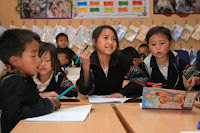[MLE] Vietnam’s Bilingual Experiment - good outcomes
Dear MultiLingual Education friends,
It is always joy to hear positive stories from neighbours. The story below is from the neighbouring country, Vietnam. It is interesting to see how nearly 500 students from three minority language groups who are enrolled in bilingual education program,are doing remarkably well. They could catch up with the main stream, Kinh children, in various aspects such as admission to higher level school, drop-out rates, etc.
For more detail, continue to read below or here
With thanks to Susan Malone for the tip
Regards,
Karsten
--
Karsten van Riezen
Education Consultant, LinkedIn Profile
SIL International, South Asia Group
All mailings since 2005 are posted on: www.mle-india.net.
Recommended sites: India: http://www.nmrc-jnu.org/; International: http://www.mlenetwork.org/
Disclaimer: This mailing list is an informal way to share mother tongue based multilingual education (MLE) related information. The sender neither claims credit or responsibility for the reports and events shared through this mailing list. Subscribing or unsubscribe by writing "[MLE] Subscribe" or "[MLE] Unsubscribe" in the subject-line and send a message to: karsten_van_riezen@sil.org. Any contributions or suggestions are welcome.
|
April 24, 2013, 7:48 am
Vietnam's Bilingual Experiment
By LIEN HOANGThe country is experimenting with bilingual education for Khmer, Hmong and Jarai students, most of whom don't speak Vietnamese, the national language. This could offer a promising solution to some of Vietnam's yawning socioeconomic gaps.
The pilot classes teach primary school children in their mother tongue while phasing in Vietnamese. Results already show these pupils pulling ahead of minority peers who aren't in the program, suggesting this method could have a long-term impact on their success.
Prime Minister Nguyen Tan Dung said this month that Vietnam must fix the income and other disparities that ethnic minorities face. Expanding mother-tongue-based education would go a long way toward that end.
Currently, just 494 students across three provinces benefit from these bilingual classes, a joint project that pairs Unicef with the Education and Training Ministry. The sample is small but reflects progress.
"We see quite remarkable differences in the learning outcomes," said Mitsue Uemura, chief of Unicef Vietnam's education section.
Uemura told me that Unicef takes the strategy a step further by designing textbooks not only in the mother tongue but with cultural references that minorities identify with.
Vietnam counts 53 ethnic minorities comprising 14 percent of the population, as of the 2009 census; the remainder are Kinh. By nearly every measure, minorities lag far behind Kinh people in such areas as wealth, nutrition and infant mortality. This is true of education as well: 25 percent of Kinh make it all the way through middle school, while only 15 percent of minorities do, according to the General Statistics Office. The Hmong hold up the tail end, with nearly half of the community never attending school (compared with 3 percent of Kinh) and only 38 percent knowing how to read (compared with 96 percent of Kinh).
But the trials in bilingual learning are chipping away at barriers to equality. They're certainly more effective than other initiatives that have been cosmetic, such as ethnic beauty pageants and festivals, or those programs that come too late for the children, like affirmative action at university.
Truong Van Mon, an anthropologist, told me that these improved communication skills would help minorities in everything from finding work and securing bank loans to signing up for health services.
"Language is important because it influences everything," said Mon, whose business card has script in both Vietnamese and Cham, his native tongue.
Mon recalled growing up in the southern coastal town of Phan Rang, former capital of the ancient Champa empire. He struggled to learn Vietnamese, which he hadn't encountered until going to school. Now he speaks it fluently and teaches at the University of Social Sciences and Humanities in Ho Chi Minh City, but bilingual instruction would have eased the transition.
"You're American, right?" he asked me in Vietnamese. "I'm Vietnamese. If we take a class in English, obviously you will do better."
Unicef hasn't calculated the cost for Vietnam to implement its teaching method nationwide, but a Unesco report quotes an estimate from "An Introduction to Language Policy: Theory and Method," edited by Thomas Ricento, saying such programs can add 3 percent to 4 percent to a country's education budget. That sounds like a small investment with a big return.
